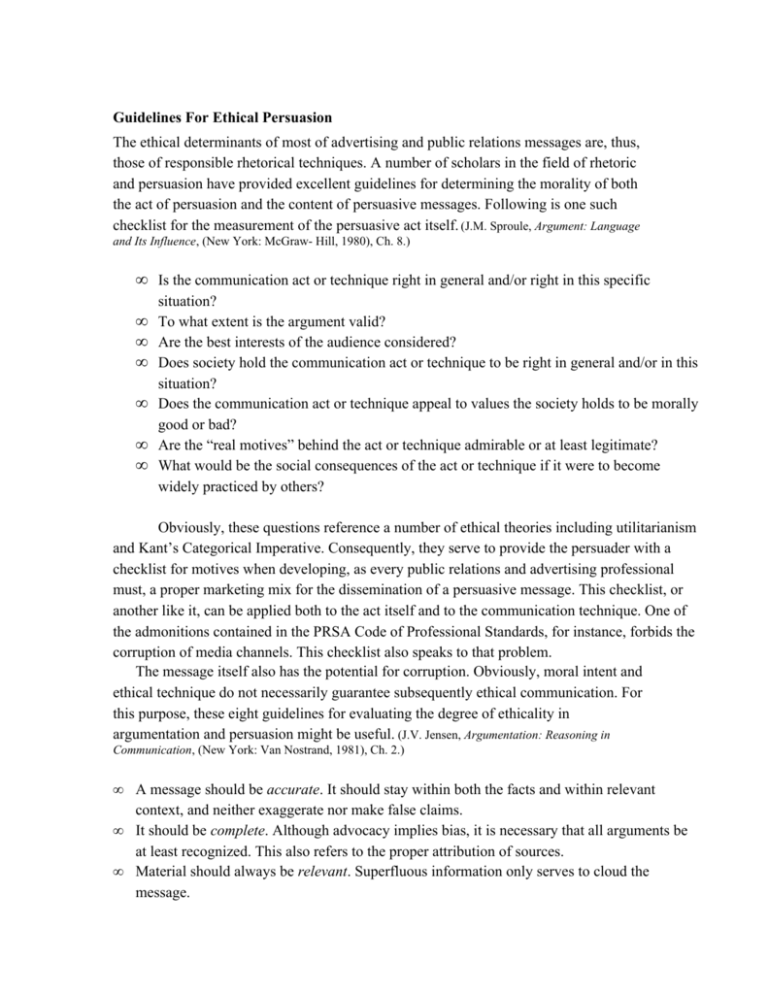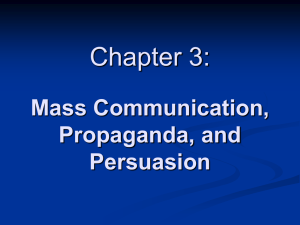Guidelines For Ethical Persuasion The ethical determinants of most
advertisement

Guidelines For Ethical Persuasion The ethical determinants of most of advertising and public relations messages are, thus, those of responsible rhetorical techniques. A number of scholars in the field of rhetoric and persuasion have provided excellent guidelines for determining the morality of both the act of persuasion and the content of persuasive messages. Following is one such checklist for the measurement of the persuasive act itself. (J.M. Sproule, Argument: Language and Its Influence, (New York: McGraw- Hill, 1980), Ch. 8.) • Is the communication act or technique right in general and/or right in this specific • • • • • • situation? To what extent is the argument valid? Are the best interests of the audience considered? Does society hold the communication act or technique to be right in general and/or in this situation? Does the communication act or technique appeal to values the society holds to be morally good or bad? Are the “real motives” behind the act or technique admirable or at least legitimate? What would be the social consequences of the act or technique if it were to become widely practiced by others? Obviously, these questions reference a number of ethical theories including utilitarianism and Kant’s Categorical Imperative. Consequently, they serve to provide the persuader with a checklist for motives when developing, as every public relations and advertising professional must, a proper marketing mix for the dissemination of a persuasive message. This checklist, or another like it, can be applied both to the act itself and to the communication technique. One of the admonitions contained in the PRSA Code of Professional Standards, for instance, forbids the corruption of media channels. This checklist also speaks to that problem. The message itself also has the potential for corruption. Obviously, moral intent and ethical technique do not necessarily guarantee subsequently ethical communication. For this purpose, these eight guidelines for evaluating the degree of ethicality in argumentation and persuasion might be useful. (J.V. Jensen, Argumentation: Reasoning in Communication, (New York: Van Nostrand, 1981), Ch. 2.) • • • A message should be accurate. It should stay within both the facts and within relevant context, and neither exaggerate nor make false claims. It should be complete. Although advocacy implies bias, it is necessary that all arguments be at least recognized. This also refers to the proper attribution of sources. Material should always be relevant. Superfluous information only serves to cloud the message. • • • • • Openness implies that alternatives be recognized even if the intent of the message is to promote only one of them. The message should be made understandable through the minimization of ambiguity, avoidance of oversimplification, and distortion of accuracy. Sound reasoning should be in evidence containing only appropriate appeals to values, emotions, needs, and motives. Social utility should be promoted. Communicators should demonstrate benevolence through sincerity, tact, and respect for dignity. Richard Johannesen proposes a series of guidelines that would remove some of the potential for ethical error from the process of ghost writing. • • • • • What is the communicator’s intent and what is the audience’s degree of awareness? In other words, does the communicator pretend to be the author of the words he speaks or over which his signature appears? And how aware is the audience that ghostwriting is commonplace under certain circumstances? If we assume, as most do, that presidential speeches are ghostwritten, then the only unethical act would be for the President to claim to author his own speeches. Does the communicator use ghostwriters to make himself or herself appear to possess personal qualities which he or she really does not have? In other words, does the writer impart such qualities as eloquence, wit, coherence and incisive ideas to a communicator who might not possess these qualities otherwise? The degree to which the writing distorts a communicator’s character has a great deal to do with ethicality. What are the surrounding circumstances of the communicator’s job that make ghostwriting a necessity? The pressures of a job often dictate that a ghostwriter be used. Busy executives like busy politicians may not have the time to write all the messages they must deliver on a daily basis. However, we don’t expect the average office manager or university professor to hire a ghostwriter. Part of the answer to this question lies in the pressures of the job itself, and the other part has to do with the need and frequency of communication. To what extent do the communicators actively participate in the writing of their own messages? Obviously, the more input a communicator has in his or her own writing, the more ethical will be the resultant image. We really don’t expect the President to write his own speeches, but we do expect that the sentiments expressed in them will be his own. Does the communicator accept responsibility for the message he or she presents? When former president Ronald Reagan’s press secretary, Larry Speakes, disclosed in his book that many of the quotes attributed to the president were, in fact, either made up or “borrowed” from someone else, he caused quite an ethical uproar. Part of the problem with the Larry Speakes revelation was that the President denied the accusations. In other words, he claimed he never approved Speakes’ work. Most communicators simply assume that whatever they say or whatever they sign their names to is theirs, whether written by someone else or not. This is obviously the most ethical position to take. • Do not use false, fabricated, misrepresented, distorted, ore irrelevant evidence to • • • • • • • • • • support arguments or claims. Do not intentionally use unsupported, misleading, or illogical reasoning. Do not represent yourself as informed or as an “expert” on a subject when you are not. Do not use irrelevant appeals to divert attention or scrutiny from the issue at hand. Among the appeals that commonly serve such a purpose are; “smear” attacks on an opponent’s character; appeals to hatred and bigotry; derogatory insinuations—innuendo; God and Devil terms that cause intense but unreflective positive or negative reactions. Do not ask your audience to link your idea or proposal to emotion-laden values, motives, or goals to which it actually is not related. Do not deceive your audience by concealing your real purpose, by concealing the group you represent, or by concealing your position as an advocate of a viewpoint. Do not distort, hide, or misrepresent the number, scope, intensity or undesirable features of consequences or effects. Do not use “emotional appeals” that lack a supporting basis of evidence or reasoning, or that would not be accepted if the audience had time and opportunity to examine the subject themselves. Do not oversimplify complex, gradation-laden situations into simplistic two-valued, either-or, polar views or choices. Do not pretend certainty where tentativeness and degrees of probability would be more accurate. Do not advocate something in which you do not believe yourself. R. Johannesen, Ethics in Human Communication, Waveland Press, pp.138-139.





